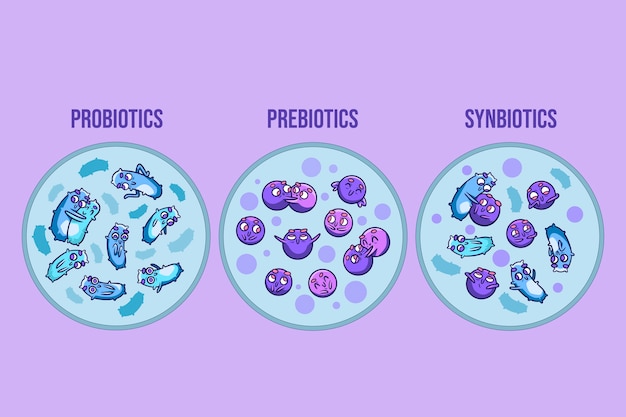
Prebiotics and Probiotics: What’s the Difference?
Most people are familiar with the term probiotics, especially those who enjoy fermented foods like kefir and kombucha. When you consume probiotics, they populate your digestive tract with beneficial bacterial colonies. Many people take probiotics because factors like illness, environmental pollutants, processed food, and even stress can disrupt the balance of bacteria in the gut. When harmful bacteria outnumber the beneficial ones, it can lead to health issues.
Unlike probiotics, prebiotics are not living organisms. Prebiotics are the nutrients that feed probiotics, stimulating their activity in the gastrointestinal tract. Probiotics are constantly battling and need prebiotics from fiber-rich foods to stay strong. Not only do prebiotics help probiotic colonies thrive, but they also promote overall well-being.
What are the Other Benefits of Prebiotics?
Prebiotics offer several benefits, including metabolic support, improved mineral absorption, better vitamin utilization, enhanced laxation, and immune system benefits. They may also help maintain normal blood sugar levels. It’s important to note that prebiotics affect everyone differently, and the current intestinal health of the individual should be considered. Some research indicates that people with gastrointestinal illnesses like Crohn’s disease or irritable bowel syndrome might experience worsened symptoms when taking prebiotics. Achieving internal harmony is necessary before optimizing it.
What are the Benefits of Probiotics?
Probiotic bacteria support digestion and offer numerous long-term health benefits, even from early childhood. Intestinal health significantly impacts early development. Probiotics are recommended for inflammatory bowel diseases and intestinal distress. They also positively affect oral and periodontal health. Since antibiotics can destroy both harmful and beneficial bacteria, probiotics are often taken during antibiotic therapy to maintain internal balance.
Studies suggest that some probiotics can suppress mechanisms leading to autoimmune diseases and sensitivities to pollens, dust, and other environmental debris. Probiotics have also been shown to improve breathing ability. Researchers have found that probiotics reduce intestinal transit time, promoting regular bowel movements.
In animal studies, probiotics have shown benefits regarding serotonin levels, providing additional support against anxiety and cognitive decline. Considering that 90% of serotonin production and regulation occurs in the gut, these findings are not surprising.
Sources of Prebiotics and Probiotics
Prebiotics are mainly derived from fiber, such as inulin. Yogurt marketed as probiotic often contains inulin (a prebiotic) and live active cultures (probiotics). Other good sources of prebiotics include acacia gum, dandelion greens, garlic, asparagus, beans, oats, and chicory root.
Two of the most well-known strains of probiotics are Lactobacillus and Bifidobacteria. These strains can be found in yogurt, kefir, other fermented foods like sauerkraut, miso, tempeh, and pickled vegetables. If you don’t consume these foods, probiotic supplements are an easy way to enjoy the benefits of probiotics. However, be aware that the quality of these supplements can vary significantly, so it’s important to choose a product from a reputable company with a verifiable production process.



